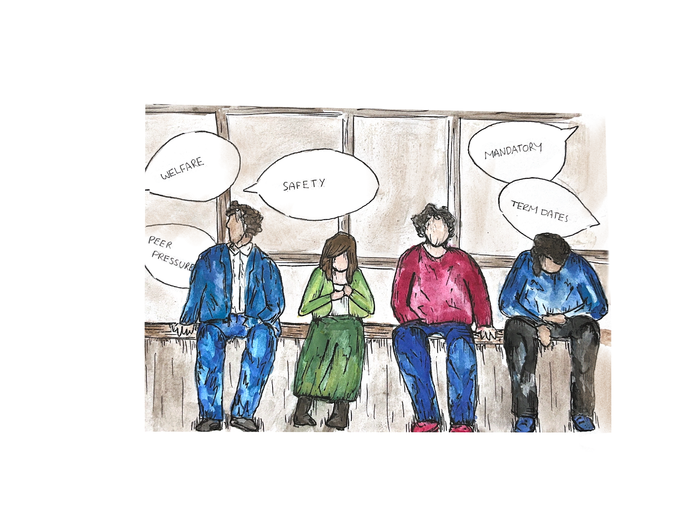Nathan Cofnas shouldn’t be silenced
Remy Rushbrooke argues that we should defeat Cofnas’ ideology on our own terms rather than censoring him

Nathan Cofnas has evaded the pikes and pitchforks wielded by the student body, in response to his controversial blog post. An internal University investigation has just cleared him from any disciplinary action. Such was the uproar at his paper ‘A Guide for the Hereditarian Revolution’ that Emmanuel College ended their affiliation with the fellow – good – yet 58 official student complaints against him were thwarted under the Uni’s free speech code of practice. I think the Uni got it right.
Mr. Cofnas is a crackpot biologist and a racist; his ideas are lofty, and certainly revolutionary, so, protecting his freedom of expression is essential. In fact, his right as an academic to propagate his opinions is imperative under the law – the Free Speech Act which our government has to-ed and fro-ed over – and under any sound vision for academic advancement. Dribblings from the SU that the University ought to discipline him are toothless. Per Mill, Voltaire or Milton there are fantastically good reasons why we should not, must not, cede to some board of authority, to choose which ideologies and conjectures we may be exposed to. It’s equally important that we are forced, on occasion, to pose the question to ourselves: why do we know what we think we know? And to be able, when faced with opinions we find disagreeable ad extremum, to lay down our case with confidence and intellectual courage.
“To my mind, the piece’s most contemptible aim is at the eradication of multiculturalism, and erection of racial barriers”
Well then, it’d be remiss of me not to comment on the thing itself. I have read ‘A Guide for the Hereditarian Revolution’ in its entirety; swallowed it, digested it, and am rather minded to excrete it. However I’m in no doubt about the piece’s worth, since it repeatedly drags us to the core of most liberal values (which Cofnas dubs indiscriminately “wokism”): the idea that all races of humankind are equal, under the dispassionate hand of nature – the scattering of those genes which decide cognitive ability and personality type – and should all therefore be treated equally within society.
Cofnas plainly rejects this. He’s right that the thought of abandoning the Equality Act, or Critical Race Theory is deeply troubling for the academic elite. He’s wrong in his conclusions from the data. Like most hereditarian science – which, when leveraging the Educational Attainment (EA) of different skin colours, skims over irreparable socioeconomic biases within its study groups, some as basic as permanent income – he displays a contempt for history. His assertion that “under a colourblind system […] blacks would make up 0.7% of Harvard students” foregoes an entire criterion for admission, and his image of meritocracy is uncalibrated to the weight of socioeconomic realities. His ‘race realism’ fails to explain why, for instance, the white working class is the lowest performing demographic in the UK as regards EA. One might tentatively conclude that EA is better attributed to class than race. That’s a better shot, at least, than putting attainment differences down to the selectional requirements of “hunting and gathering on the savannah” (NB for a more sensible picture on genetic variation seek the work of Lewontin).
“Cofnas’ ideas are deeply offensive, but they are nothing more than that”
To my mind, the piece’s most contemptible aim is at the eradication of multiculturalism, and erection of racial barriers. Here Cofnas finds a crooked middleground between two important, and certainly not mutually exclusive, sociological pillars: the right of each individual culture to celebrate their unique identity, and the merit of plurality, and diversity of opinion, within a society. For Cofnas, “race is like an extended family” yet humankind is not. His vision is backward and tribalistic on its face.
That’s probably more attention already than the blog deserves. Of course, the piece’s greatest insult is its huge offensiveness towards the community of black Cambridge students, whose merit is called into question by a university-hired professor. Indeed, I too am offended by such a notion, albeit to a far less personal end. In fact, I’m glad to say I couldn’t name a single Cambridge acquaintance, peer or teacher, who I believe would not be troubled by the messages in ‘A Guide for the Hereditarian Revolution’. It’s for precisely this reason that Cofnas’s voice does not present any danger to our community. It must now be said that the blog’s content does not step outside the boundaries of lawful free speech: there is nothing, as corroborated by the investigation, which could be classed as harassment, incitement to violence, or discrimination. In his words, “the empirical evidence shows that, for the vast majority of people, there is no clear psychological connection between viewing someone as less intelligent and hating them, let alone wanting to discriminate against or murder them”.
Cofnas’ ideas are deeply offensive, but they are nothing more than that. Censoring those ideas which we find offensive signals a grave defeat: why should we cower in consensus? Is this not a battle we can win? Condemn bigotry on your own terms.
 News / Colleges charge different rents for the same Castle Street accommodation2 March 2026
News / Colleges charge different rents for the same Castle Street accommodation2 March 2026 News / News in Brief: waterworks, wine woes, and workplace wins 1 March 2026
News / News in Brief: waterworks, wine woes, and workplace wins 1 March 2026 News / Climate activists protest for ‘ethical careers policy’1 March 2026
News / Climate activists protest for ‘ethical careers policy’1 March 2026 News / Angela Merkel among Cambridge honorary degree nominees27 February 2026
News / Angela Merkel among Cambridge honorary degree nominees27 February 2026 News / Private school teacher who lied about Cambridge degree barred from teaching27 February 2026
News / Private school teacher who lied about Cambridge degree barred from teaching27 February 2026










